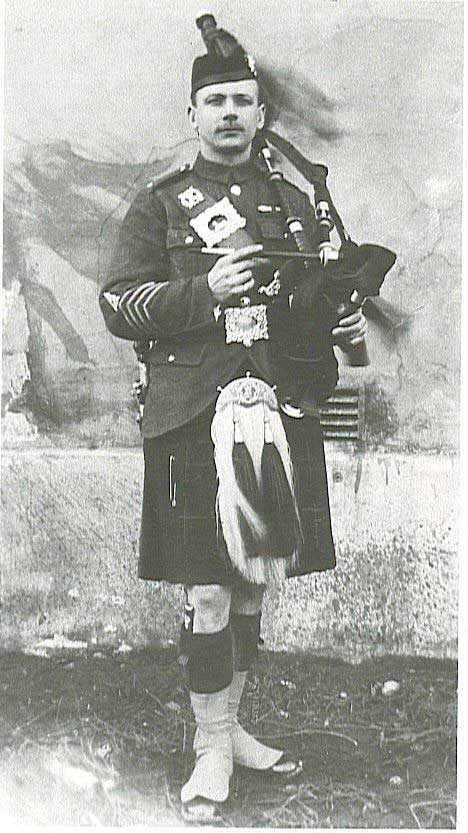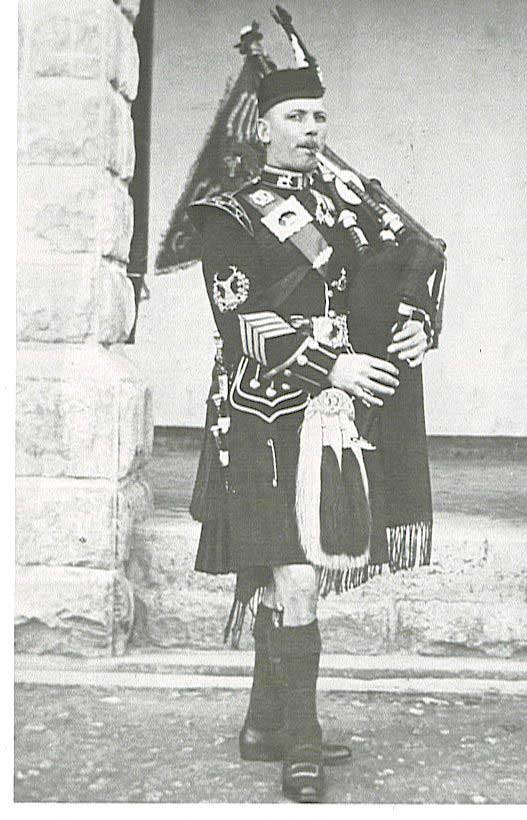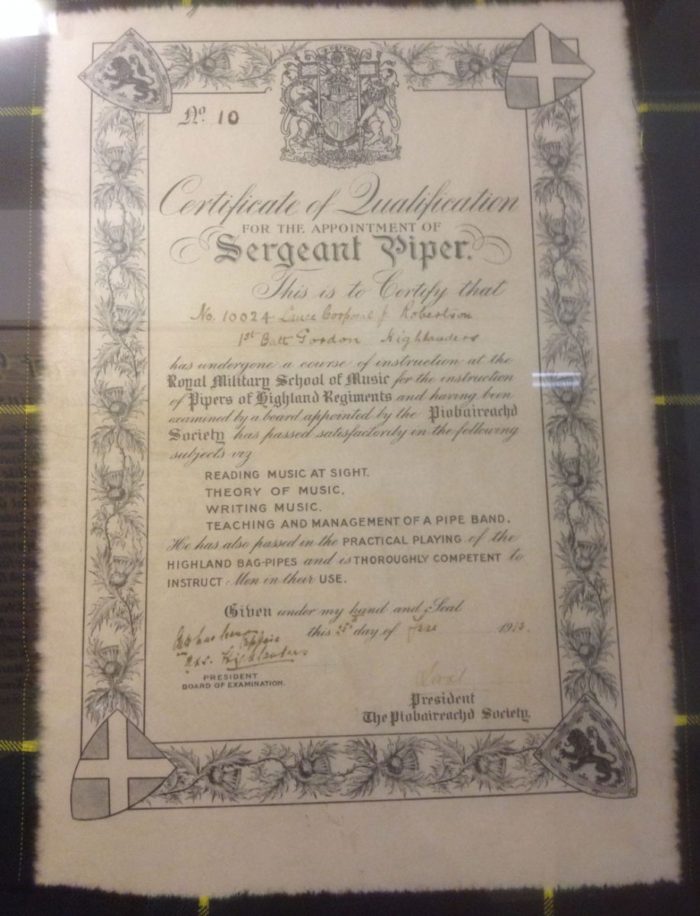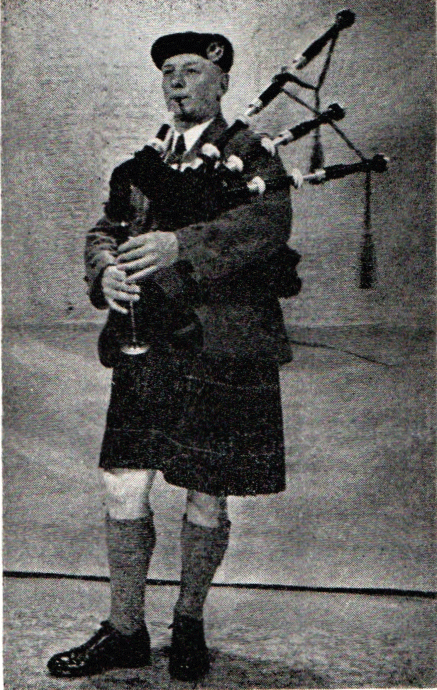James Robertson
James Robertson (1886-1961)

There were several prominent piping figures named ‘James Robertson’ during the first half of the 1900s; this one, James Robertson of Banff, a Gordon Highlander, was a prolific composer of bagpipe music.
Born in Bannffshire on August 23rd, 1886, he began learning pipes at the age of 15 from P/M William Sutherland of Airdrie.
In 1906 he enlisted in the Gordon Highlanders, where he would befriend and come under the influence of the great G. S. McLennan, the greatest Gordon piper of all. G. S. taught Robertson from 1906 to 1913, recommended him for promotion to Lance Corporal in 1912, and oversaw his advancement to Pipe Corporal in 1913.
Just before the Great War, he attended the Military School of Piping at Inverness under John MacDonald of Inverness, where he certainly would have studied piobaireachd, and became the tenth graduate of what would come to be known as the Army School of Piping.
In August 1914 he went with the 1st Battalion of the Gordons to France as part of the British Expeditionary Force. The Gordon Highlanders Pipe Music Collection Volume II (1985) describes his trials and adventures during the war years:

On August 13th there were eighteen pipers in the Battalion, most of whom had been pupils of G. S., but by 27th August only two had escaped capture or death. Robbie was amongst the former being taken with the majority of the Battalion at Bertry on 27th August, and he was to spend virtually the whole War as a prisoner. He was sent to Sennelager near Paderborn in September 1914 and was court martialled by the Germans on three occasions during his time as a POW for ‘refusing to carry out work of a military nature, i.e. building Zeppelin sheds and, as a Non-Commissioned Officer, inciting men to refuse similar work.” For years afterwards, Robbie, in his inimitable, amusing style, would recount his experiences as a prisoner in charge of liquidising human excrement prior to its application as a fertiliser on the surrounding German farmland. This typically efficient German approach was frequently sabotaged by the prisoner in charge, which leaves much to the imagination! Indeed, on 17th December, 1915, so difficult had he become to his captors that he was sentenced to one year’s imprisonment. Actually, a large part of this period was spent in solitary confinement and the sentence took one year, ten months to complete. He would not give in. Indeed, such had been his example to others that in February 1920 he was awarded the Meritorious Service Medal in recognition of his valuable services as a prisoner of war.
In April of 1918 he was exchanged as a prisoner and the next year he rejoined the 1st Battalion in Limerick. But it was during his incarceration as a POW in 1915 that he composed his best known tune, “Farewell to the Creeks.” It was about the Creeks of Portknockie, where he used to holiday at his uncle’s. Many years later he spoke be still being in possession of the piece of yellow blotting paper onto which he first transcribed the tune, apparently while he was in solitary confinement.
A champion boxer in the regiment as a young man, he was respected as a pipe major, a piper and a soldier, though the war and his foreign service perhaps robbed him of his due as a competitive player.

After serving in Malta and finally at the depot in Aberdeen, he retired in April, 1927 and worked as a janitor at the Banff Academy until 1953. He also served as a Special Constable in Banff, achieving the rank of Sergeant.
During his latter years he taught and judged at games such as Braemar, Aboyne and Lonach in the northeast of Scotland and was a founding member of the Turriff and District Pipe Band. Ontario pipers might be interested to know that long-time Ontario piping figure Ron Rollo was one of his many pupils.
Of his personality, the June 1961 issue of the Piping Timesreported: Once a soldier, always a soldier, and this was evident in the erect bearing of Pipe-Major Robertson even in his latter years. He was possessed of a bright and breezy personality, and his cheery quips and outlook on life were a tonic to all who knew him.

He died in 1961 and lies in Banff cemetery.
JM, August 2007
-with notes from ‘The Gordon Highlanders Pipe Music Collection, Volume II’, edited by Peter Graham and Brian MacRae, published 1985

2 Comments
jimmy ‘robbie’ robertson was jasnitor at banff academy when i went to school, i always admired him he served in india with my dad ‘jock stuart, i believe he tutored Pipe Major ‘Joe Wil;son’ wh went on tobe pipe major of the gordon highlanders, if you were late for school he used tae gie ye a dunt on the lug or quick kick up the backsidea well respected gentleman..
As a descendant of Alexander Robertson of Banffshire, I may be distantly related to Pipe Major James Robertson. Tonight at the Orpington folk club in Farnborough village, Kent, there is a tribute night to Marco Lenzi, a former resident performer and the bagpiper James Moffat will play Farewell to the Creeks and we will then sing together the song that Hamish Henderson write to the tune in 1943, The Highland (51st) Division’s Farewell to Sicily.